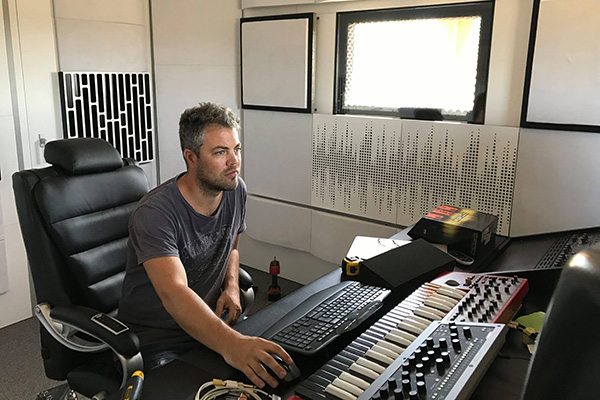THE
GHOST PRODUCER INDUSTRY
THE GHOST PRODUCER INDUSTRY
Another word surrounded by confusion and fake rumours.
The ghost producer is usually the kind of job in which one operates in the shadows, behind the scenes of more or less important projects in the music industry, under great FEEs or royalties deals as a songwriter/author.
Talking about the term for a minute, the ghost producer is known to be the producer who gets paid a lot, or even worse, “the person who does the job instead of the artist”.
Today we are going to completely destroy these beliefs and create what I like to call the “true identity” of the ghost producer by explaining the dynamics for which certain choices are made.


First of all, the ghost producer can often also be the author/songwriter of a track, and this depends on and is regulated by confidentiality contracts with the artist.
The ghost producer usually creates the musical identity of the artist, who will instead be engaged in other activities related to their brand (performing music, touring, photoshoots, branding, influencer tasks, etc.).
By now we can already tell why many people like to criticize the “ghost-produced artist”, but I would like you to try to answer the below question:
Can an artist such as David Guetta, Tiesto, Martin Garrix, Dimitri Vegas & Like Mike dedicate himself to producing in the studio when he has 250 tour dates per year?
Maybe, if they want to have a mental and physical breakdown within the first year.
Is it possible that the artist X who has 250 tour dates per year also has to manage social medias, their own label, their own songs and deals and so on..? ABSOLUTELY NOT, OF COURSE.
I guess even from this short paragraph you will understand how important the role of the ghost producer is for a big artist, and for THE WHOLE MUSIC BRAND TO WORK SUCCESSFULLY.
The artist will not earn any money without music, obviously.
NB: this isn’t a worldwide rule. There are artists that prefer produce their music and do less tour, artists that want only release music, it definitely depends on the single business model.
Generally, artists-entrepeneurs tend to delegate the musical/production process to thrid parties called ghost producers.
This is why these 2 roles are really connected and essential for each other.
Just think of the artist as a big brand or company. Do you know any big brand or company without dozens of employees? I don’t think so, unless you live in a parallel world.
Now moving on to the practical part: being a successful ghost producer will require taking decisions to understand where you want to place and how to create your career:
CUSTOMER TARGET💵
You can choose a wide target, i.e. many customers you will never actually meet, who buy your productions at medium-high prices paying a fee OR you can choose a specific target – even one or 2 artists only – with whom you can grow your brand/reputation.
The 2 things can also be easily coordinated, as the second option will be a long term match with the artist if you start from 0.
NICHE🎯
choose your genre(s). You can specialise only in house or trap, as well as decide to do everything, which always leads to the usual question though:
better 1 thing done at the best of your knowledge or many things done mediocrely?
Personally, in this case I decided to do more genres, but it took me years to reach an high level on all of them.
💰MOST COMMON
PAYMENT METHODS:
EASY
DIRECT FEE 💵
e.g. 2500€ per production and for the sale of all rights related to the track.
How can you choose your fee: usually depends on the genre and the quality of the song.
When I get started I was asking from 250 to 600€ for one ghost.
The general price target nowadays goes from 200 to 2/3k for a direct payout ghost.
MEDIUM
ROYALTIES SPLIT💎
A part of the earnings from streaming or performance or both goes to the ghostproducer.
In this case, the ghost producer’s name cannot remain completely invisible as they will appear as the author of the song, so it will be possible to see who produced the song by simply checking the artist credits)
In this last situation, the ghost producer can be interpreted as the “songwriter” or author of the song.
HARD
LONG TERM DEAL📄
If the ghost producer is particularly good at one thing, they may be offered an exclusive contract with advance payment to work with only a certain number of artists or even just one.
Some examples could be being exclusively signed from an artist as personal/team ghost proucer (example Tiesto) or getting a contract as producer for a major label.
This works like getting a publishing contract as a beatmaker.
As you can see, there are many and various ways to earn money with ghost productions, some more difficult than others.
Also here it is essential to have a great strategy. It is no news that this job is one of the most “cloudy” and mysterious. In fact, being a successful as a ghost producer often means to have good contacts in the industry and a solid network.
You have to consider the ghost producer as the person who is famous but only inside the industry, not to the mainstream audience.
I have been a ghost producer for years and I would suggest focusing on just one genre and looking for a niche of 3/5 artists to work for, and at the same time working on ghost productions on online portals or for a specific customer target.
As I mentioned before, I learned more than one genre but it took me years to reach an high standard on all of them.
Now let’s take a closer look to the pros and cons of this job:
PROS✅
You will be “one in a million” as soon as you achieve stability with this profession.
I can 100% assure you that only few people in the industry are able to achieve this, and consequently you will have a very high market value.
- You will be a true expert! Learning this profession will make you extremely good at music knowledge, production and mixing etc…
- You will work with the top players of the industry. Say what you want, but once you reach the best of your niche means you’re on the current highest level of the music industry too.
CONS❌
Expensive training and equipment: unfortunately, both training and the equipment you have to buy (software, plugins, possible rent or studio construction) are very expensive, so you will have to face a great initial investment.
However, you don’t need to have everything right from the start, even good headphones can easily be a starting point in my opinion.
- Initial competition: although there’s high demand from the top end, when you look at the middle/low end of the industry, it is still very saturated and full of people selling themselves as pros.
Okay, I hope you learned something new from this profession, this is definitely a long term work but I can assure you will have great satisfactions if you focus on it.
Join the Black Mind Discord Community🎯
We created a fully-oriented Discord Server for Producers and Rappers:
You will find free samples and beats, weekly music and business tips and tricks, an entire community to network and share your products.



